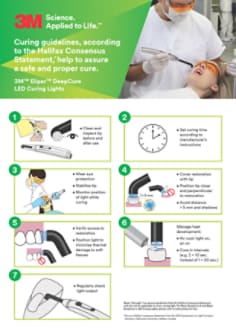
3M™ Filtek™ Bulk Fill Flowable Restorative, Syringe
- 3M ID B5005386010
Details
Highlights
- Flowable composite resin filling with virtually no bubbles or material “run-on”
- Easy-to-bend cannula improves access to deep restorations
- Ergonomic design is easy to hold and requires less effort to inject
- 4 mm depth of cure reduces the need for incremental placement and risk of contamination
- Flowable viscosity results in easy handling and adaptation
- Green syringe barrel indicates remaining material volume
- Blend of fillers and monomers maximizes strength, wear resistance and radiopacity
- Complete your premium restoration using the gold standard of adhesion with 3M™ Scotchbond™ Universal Plus Adhesive
The 3M™ Filtek™ Bulk Fill Flowable Restorative uses an optimal blend of fillers and monomers designed to maximize strength, wear resistance and radiopacity and minimize shrinkage. The innovative syringe design virtually eliminates bubbles or “run-on” to give you more control for precise placement in deep restorations.

Discover what makes 3M™ Filtek™ Bulk Fill Flowable Restorative innovative – including its easy-to-use, ergonomic syringe.
The 3M™ Filtek™ Bulk Fill Flowable Restorative provides easy adaptation in deep restorations with little or no instrumentation, thanks to its low viscosity. An intelligent selection of monomers and fillers that provides low shrinkage and low polymerization stress produces a restorative that can be used to perform bulk fill restorations with a depth of cure of up to 4 mm. This flowable composite resin filling is excellent as a bulk fill base or as a low-stress liner.
-
 Virtually no bubbles
Virtually no bubblesSyringe design virtually eliminates bubbles and material “run-on”.
-
 Easy to use
Easy to useTriangle finger plate and plunger make it easier to hold and inject.
-
 Indicated for composite warming
Indicated for composite warmingSyringes can be warmed up to 70ºC for up to one hour, up to 25 times.*
*3M internal data on file
The syringe features an ergonomic, easy-to-hold plunger along with a bendable cannula and requires less effort to dispense, increasing comfort and enabling precise placement. The upgraded tip features a tapered inner wall design that matches the taper angle of the syringe itself. The continuous and smooth tapered surface allows the pocket of air created with each new tip attached to be pushed out of the tip by the flow in front of the paste. The green syringe barrel doubles as an indicator of how much flowable composite is remaining. When no green is visible on the barrel, the syringe is out. The plunger includes a venting feature that allows air to escape during the manufacturing process which results in virtually no bubbles or “run-on.”
-

Take a look at the impact of a “low bubble” delivery system from 3M™ Filtek™ Bulk Fill Flowable Restorative in this case study: Posterior Composite Injection Over-Moulding Following Root Canal Treatment.
Photos courtesy of Dr. David Clark
Suggested applications
- Base under Class I and II direct restorations
- Repair of resin and acrylic temporary materials
- As a core build-up where at least half the coronal tooth structure is remaining to provide structural support for the crown
- Liner under direct restorative materials
- Pit and fissure sealant
- Restoration of minimally invasive cavity preparations (including small, non stress-bearing occlusal restorations)
- Class III and V restorations
- Undercut blockout
- Repair of small enamel defects
- Repair of small defects in aesthetic indirect restorations
Specifications
| Brands | Filtek™ |
| Composite Type | Bulk Fill Flowable |
| Cure Type | Light Cure |
| Delivery System | Syringe |
| Material Structure | Microhybrid Composite |
Resources
Best Practices
(PDF, 752KB)
 Curing Guidelines - Halifax Consensus Statement
Curing Guidelines - Halifax Consensus Statement